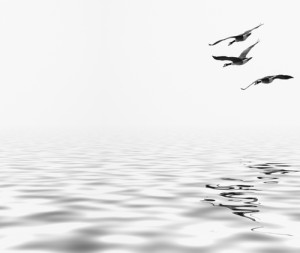I traveled to a remote spot on the Pacific shore in northern California for a week-long Commonweal Cancer Help Retreat in 2005. I wasn’t five years out yet from treatment for triple negative breast cancer—chemotherapy, radiation and surgery. Recurrence rates during the first five years are higher with this diagnosis than with most other forms of breast cancer. After treatment for triple negative there is nothing more they can do except say ‘good luck.’ Until my experience at Commonweal, I lived in a place of vulnerability and fear of recurrence and death. A mass on my ovary appeared two years into recovery which sent me reeling again. I prepared for the worst. At the retreat I found peace of mind no matter what the outcome.
Every morning after yoga during our Commonweal retreat, the teacher read one poem. He asked us to close our eyes, and he read the poem twice. The first time I listened intently. The second time the poem seemed to enter my entire body effortlessly through the pores. My understanding of the poem went straight to my heart.
The poem “Wild Geese” by Mary Oliver was not read to me there, but I have heard a number of Buddhist teachers share it during dharma talks. I never tire of it.
Whenever I feel that I’m not okay, that I don’t belong, that I’ve lived my life all wrong, that I missed choices and turns that I should’ve taken, reading this poem doesn’t just comfort me. It moves me to a different place, a place I am tempted to call home.
~ ~ ~
Two months before brain surgery I was invited to speak at a Collaborative Practice annual event. I planned to say just a few words, then read “Wild Geese.” I wasn’t sure how a roomful of lawyers, therapists and accountants might receive it, but I trusted this group was like me, looking for answers to difficult questions. Most worked with families going through divorce and other painful conflicts. They were constantly looking to improve their practice. I believed this poem might reassure them in some way. The first morning of the conference a participant started to play a short video about geese and their ability to cooperate. Initially I was struck by the synchronicity of another goose-themed presentation.
Next I worried that it would have the familiar story about geese and their V formation which everyone knows—how the lead goose moves to the back of the V formation when it is tired, and how the aerodynamics allow the goose to rest while still in flight. I worried people might assume this poem was repetitious and just tune out.
I was wrong. The video was elegant. The slides, words and music matched the depth and beauty of the Mary Oliver poem. I learned new things about goose behaviors. I learned that they sense when one goose is struggling and those around it start flapping harder to allow it to continue. The one that touched me most was this: when a goose is sick or injured and goes down, two geese drop out of the V formation and go down with it. They stay close by its side on the ground until it dies or recovers.
Even if this means they have to find a new V formation.
With a cancer recurrence, terminal diagnosis and brain surgery, I was the wounded goose. Loved ones dropped out of their lives to stay with me until I recovered. Some in person and many on Caring Bridge. I have never been alone during this experience, not even for a moment.
It turned out I was the last one to speak at the conference. I told the group I would read the poem “Wild Geese” twice, the way my favorite yoga teacher read poetry. I even asked them to close their eyes like he did. The second time through, my voice caught when I got to the part about the geese, and I had to stop reading or else start sobbing uncontrollably.
I imagined them all flapping hard so I could finish it, and I did.
Wild Geese
You do not have to be good.
You do not have to walk on your knees
for a hundred miles through the desert repenting.
You only have to let the soft animal of your body
love what it loves.
Tell me about despair, yours, and I will tell you mine.
Meanwhile the world goes on.
Meanwhile the sun and the clear pebbles of the rain
are moving across the landscapes,
over the prairies and the deep trees,
the mountains and the rivers.
Meanwhile the wild geese, high in the clean blue air,
are heading home again.
Whoever you are, no matter how lonely,
the world offers itself to your imagination,
calls to you like the wild geese, harsh and exciting-
over and over announcing your place
In the family of things.
—Mary Oliver

